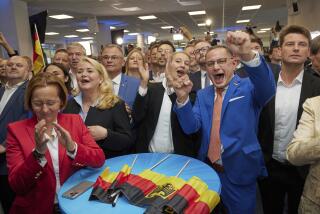Russian Reformers Lament Missteps
- Share via
MOSCOW — With the fate of one leading reformer still hanging in the balance, Russia’s democrats flogged themselves Tuesday for divisions that cost them heavily in parliamentary elections, while giving fresh indications that they will continue quarreling until the presidential vote in June.
The reinvigorated Communist Party and those loyal to ultranationalist hothead Vladimir V. Zhirinovsky will end up with more seats in the Duma, parliament’s lower house, as a result of personality clashes and power ambitions among rival reform advocates, concede political scientists and the democrats themselves.
The reformers’ failure to unite ahead of Sunday’s parliamentary vote is expected to deprive the various democracy forces of about 12% of the popular support expressed for their cause, analysts estimate on the basis of still-incomplete returns.
Grigory A. Yavlinsky, the charismatic leader of the pro-reform Yabloko movement that won between 8% and 12% of the parliamentary vote, depending on who is counting, deemed the need to find a single candidate for the presidential race the top priority for Russian reformers.
“A coalition of all forces favoring the rule of law, human rights and a free economy will be absolutely necessary” for a candidate of that persuasion to have any chance of winning the presidency six months from now, Yavlinsky declared at a news conference.
But he then blasted the two main political forces with which Yabloko would have to ally to muster a presidential bid strong enough to defeat Communist and nationalist figures.
Yavlinsky accused the government under President Boris N. Yeltsin of handing anti-reform parties victory in the Duma vote by discrediting the very name of democracy. And he lashed another staunch reform champion, Yegor T. Gaidar, for helping pass a federal budget that provided the funds for the Kremlin’s savage war against the rebel republic of Chechnya.
Gaidar’s party, Russia’s Democratic Choice, was still hovering below the minimum 5% of the parliamentary vote needed to claim seats in the Duma.
Surpassing the threshold would make Gaidar’s party the fifth to qualify for a part of the proportional distribution that will decide half of the 450 Duma seats.
Our Home Is Russia, the voting bloc created by Yeltsin and led by Prime Minister Viktor S. Chernomyrdin, won about 10% of the vote, joining Yabloko, the Communists and Zhirinovsky’s Liberal Democrats in the pool for the proportional mandates.
If Gaidar’s party fails to reach 5%, the collective strength of the pro-reform movements will be reduced by about 22 seats.
“The most tragic consequences of the vote were felt by those very reformers who talk about the need for ‘rational choices,’ ” Stanford University professor Michael McFaul said of the democratic infighting, in an apparent swipe at both Yavlinsky and Gaidar.
“I hope this serves as a lesson for them,” McFaul said of the parliamentary outcome. “The bottom line is that if they split the vote three or four ways [in the presidential election], there is not going to be a reformer on the ballot.”
An already crowded field of declared and expected candidates for the powerful Russian presidency promises to force the contest into a runoff between the top two vote-getters--which, according to the Duma voting pattern, would leave Russians with a choice between a Communist and Zhirinovsky.
Vote-counting slowed to a crawl three days into the process, with the Central Election Commission still reporting figures for only about half the ballots cast Sunday and failing to specify where the counted votes came from.
Some international election monitors and political analysts expressed fears that the unexplained delay could signify that the vote is being manipulated.
“I’m very concerned about the reporting of results right now,” Dorothy Rosenberg of the Washington-based Institute for Policy Studies told reporters when no fresh figures had been provided for nearly 24 hours. Rosenberg served as an election observer.
Sergei Markov of the Carnegie Endowment for International Peace called the monitoring process “a joke, a kind of political tourism,” as few of the hundreds who came to Russia to observe the voting stayed for the count.
More to Read
Sign up for Essential California
The most important California stories and recommendations in your inbox every morning.
You may occasionally receive promotional content from the Los Angeles Times.












